If you’re here, reading this post, it’s because you think that you don’t have any self-control with food. You’re wondering how to have self-control with food so that you don’t binge eat an entire box of cookies or two bags of chips or an entire pizza (or two).
First, you need to know that you’re not alone. Many people face challenges when it comes to managing cravings, emotional eating, and binge eating. And second, you need to know that you can overcome this. But just being hard core about discipline may not be the answer.
As a binge eating and emotional eating coach and nutritionist, I’ve helped thousands of women deal with their relationship with food. So in this post, I’m going to share tips and stories to help you have self-control with food without becoming obsessed with food rules or getting stuck in the binge-restrict cycle.
Written by Jenn Hand, Holistic Nutritionist, Board Certified Health Coach, NBC-HWC
Table of Contents
- Do You Really Need More Self Control Around Food?
- What Does It Even Mean to Have Self-Control with Food?
- How to Have Better “Self-Control” with Food
- 12 Steps to Becoming a Normal Eater and Stop Letting Food Control Your Life
- How the Mood-Food Cycle Affects Eating Habits
- Understanding Cravings and Why They Happen
- Why Hard-Core Discipline Is Not the Solution to Binge or Emotional Eating
- How to Get Back on Track If You’ve Been Overly Indulgent
- Work With a Health Coach who Specializes in Emotional Eating
- Why I Don’t Like the Term “Eating Disorder”
- Common Questions
Do You Really Need More Self Control Around Food?
Most of us believe we have a “food problem” because we don’t have enough discipline and willpower.
Being in the diet world teaches us that it’s “us” who is the problem–we just need to try harder. We feel that societal pressure that equates weight loss with willpower. But what if we don’t actually need more control around food? What if the real issue is that the more tightly we try to control, the more out of control we really feel?
It’s a big paradox on this path, and one I spent many years fighting. I convinced myself that I needed more control. But it was only when I began loosening the tight hold on food that I began to feel more trust and balance…which then helped me feel in “control.”
What Does It Even Mean to Have Self-Control with Food?
Having self-control with food doesn’t mean rigidly saying “no” to cravings or depriving yourself of your favorite foods.
To me, control means balance. It means a deep trust with yourself. It means being in tune with your body—understanding when you’re hungry, what you truly need, and how to honor those needs in a way that feels good. Real self-control is rooted in balance, mindfulness, and trust in your ability to make choices without guilt.
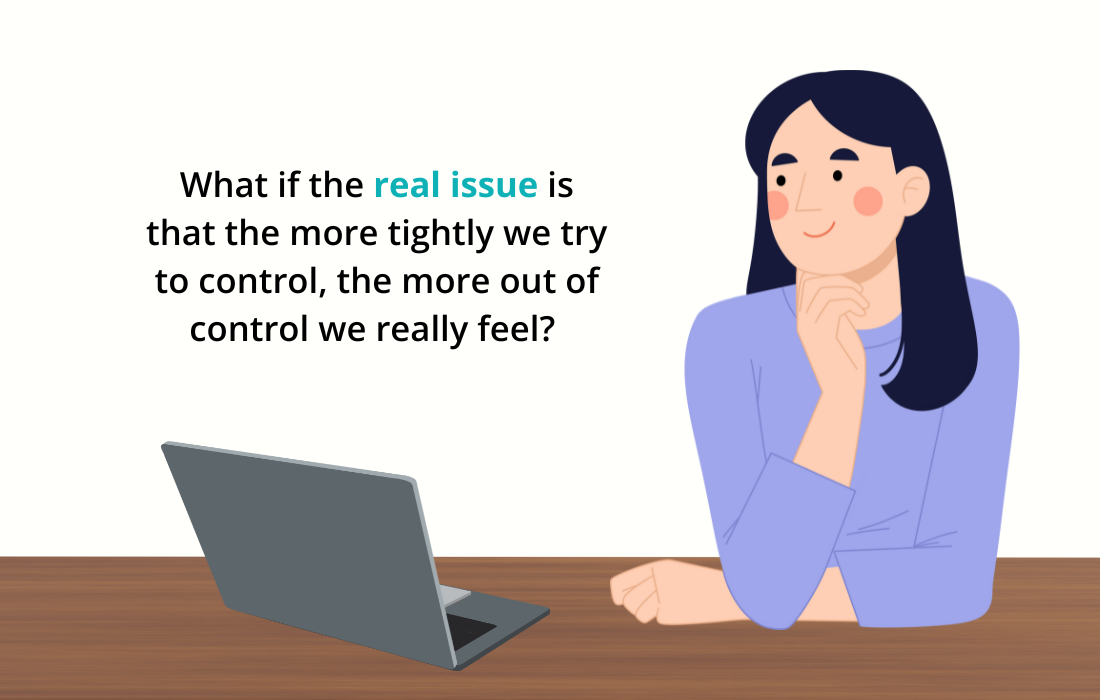
How to Have Better “Self-Control” with Food
Rather than focusing on self-control, see if you can first shift the focus to self-compassion and curiosity.
And then trust and balance follow from there! Start by eating every 3-4 hours and including foods you actually like to prevent feelings of deprivation. Check in with your body–get curious about what hunger feels like, what emotions drive you to eat, what triggers you are what you eat out of habit.
By removing the “all or nothing” mindset and working to build trust with your body, you’ll actually “lose control” less and feel more balanced and in control.
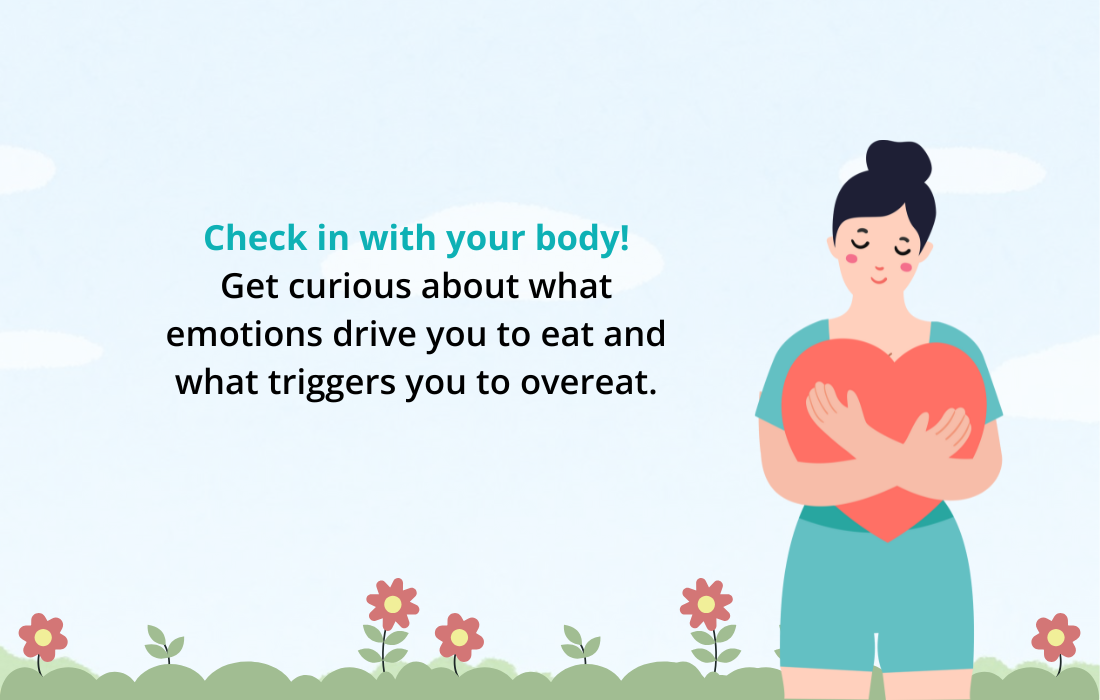
12 Steps to Becoming a Normal Eater and Stop Letting Food Control Your Life
1. Have a Hunger Reality Check
Ask yourself, “Am I actually hungry?”
If you don’t know what physical hunger feels like, this is a great time to begin to pay attention to hunger cues like stomach growling, low energy, or slight irritability, and differentiate them from emotional triggers like stress or boredom.
Eat regularly–I often recommend eating ever 3-4 hours and to use the clock to create a regular rhythm of eating. From there, you can start to explore hunger!
2. Keep a Food Journal
Track what you eat and how you feel—not for calorie counting, but to uncover patterns and triggers.
This can help you connect the dots between emotions, habits, and your relationship with food. If this feels too diet-y you can always just track the emotions around the times you do eat to help you see what people/feelings/triggers send you into the food.
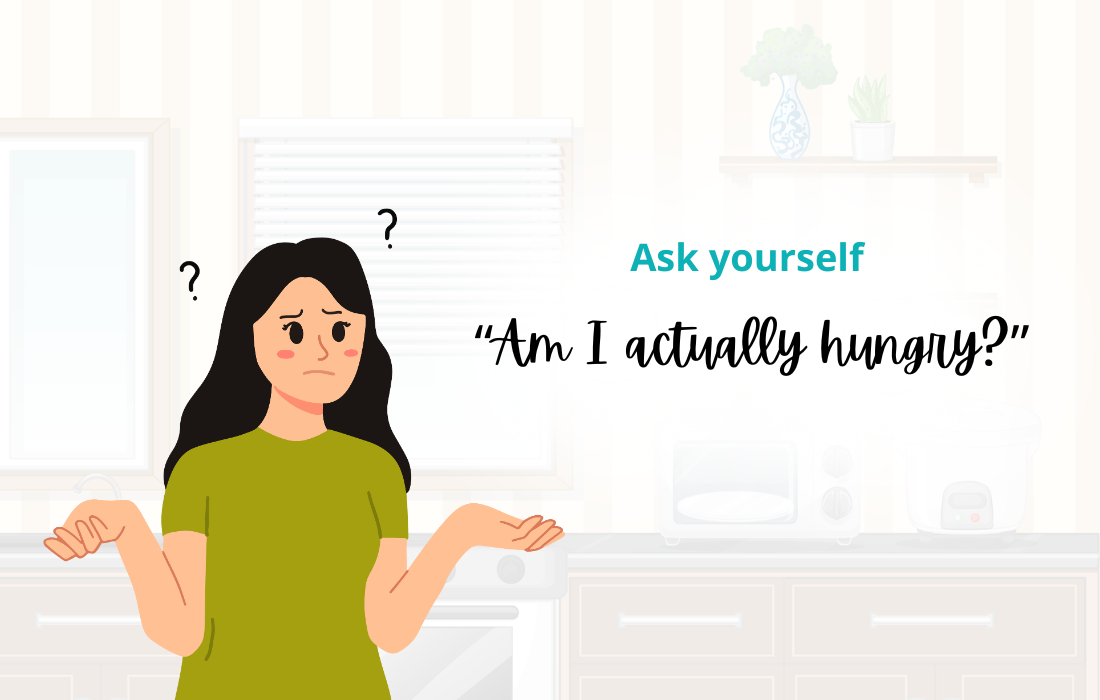
3. Tame Your Stress
Stress, overwhelm and too many to-do’s can lead to emotional eating.
Finding ways to manage it—like deep breathing, journaling, or taking a walk—can reduce the urge to turn to food for comfort. What helps you feel relaxed? What would feel calming?
Remember that what you try WILL feel different than food as a de-stresser. BUT in the long run, it serves you better.
4. Snack Healthy and Keep Snacks on Hand!
Having nourishing, satisfying snacks (and dare I say “fun foods?!”) on hand prevents extreme hunger, which can lead to overeating.
Some of my favorite snacks are nut + fruit combos, greek yogurt with granola or fruit, Eziekial bread with peanut butter and apple, and turkey and cheese rollups.
5. Keep Binge Foods Out of the House Temporarily
I’m a big fan of setting ourselves up for “success.”
And if that means keeping certain foods out of the house while you’re working towards balanced, definitely do it! You can always gradually reintroduce them when you’re ready to practice eating them mindfully
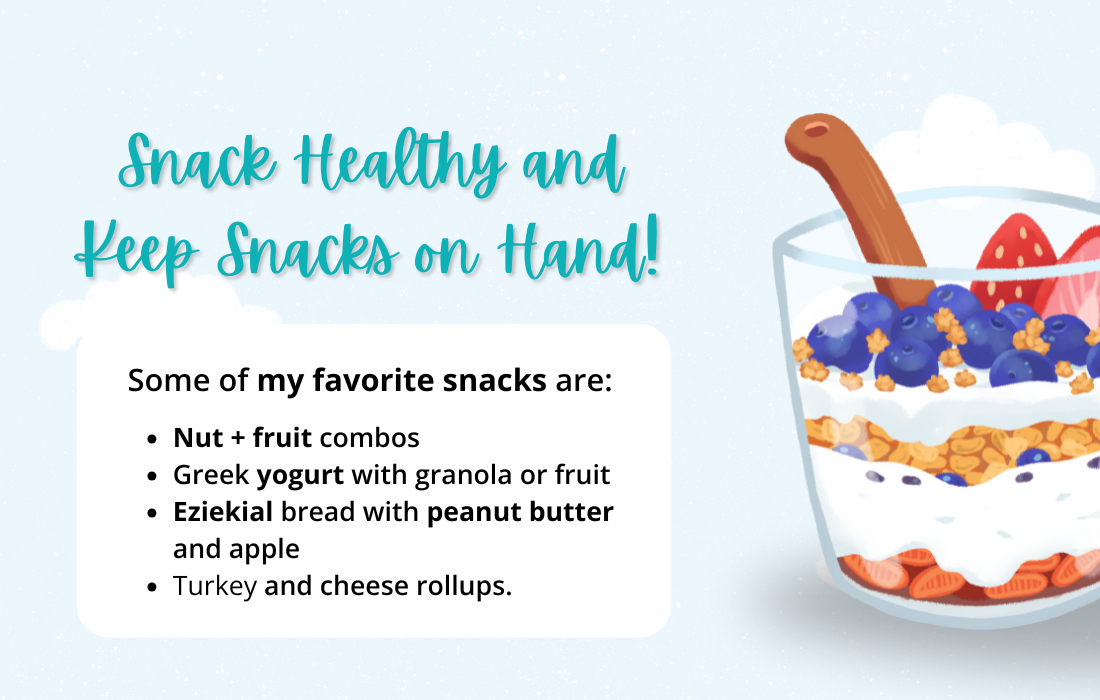
6. Um, Please Don’t Deprive Yourself
Our sneak diet brain tells us that less is more, and fewer is better.
But in reality to feel “in control” and have a healthy relationship with food, restriction always leads to bingeing. Practice allowing yourself to enjoy all foods (mentally and physically) without guilt.
This doesn’t happen all at once–it’s baby steps towards breaking food rules to allow all foods as options. The paradox of permission is that the more we allow, the less we actually want them, since the allowing takes the charge out of the food.
7. Soften the All or Nothing Mindset
This is one that almost every single person I work with battles!
See if you can soften some of perfectionism around eating. One indulgent meal doesn’t ruin your progress; you didn’t blow it by having a few extra cookies. If you feel like you overeat, focus on the next meal or snack as a way to take care of yourself and bring yourself back into balance.
8. Learn How to Avoid Boredom Eating
My mom always used to say that boredom builds character.
Being bored is a great way to reconnect with the things you forgot you enjoyed! Instead of reaching for snacks when you’re bored, try engaging your mind or body with an activity you enjoy, like reading, crafting, or dancing.
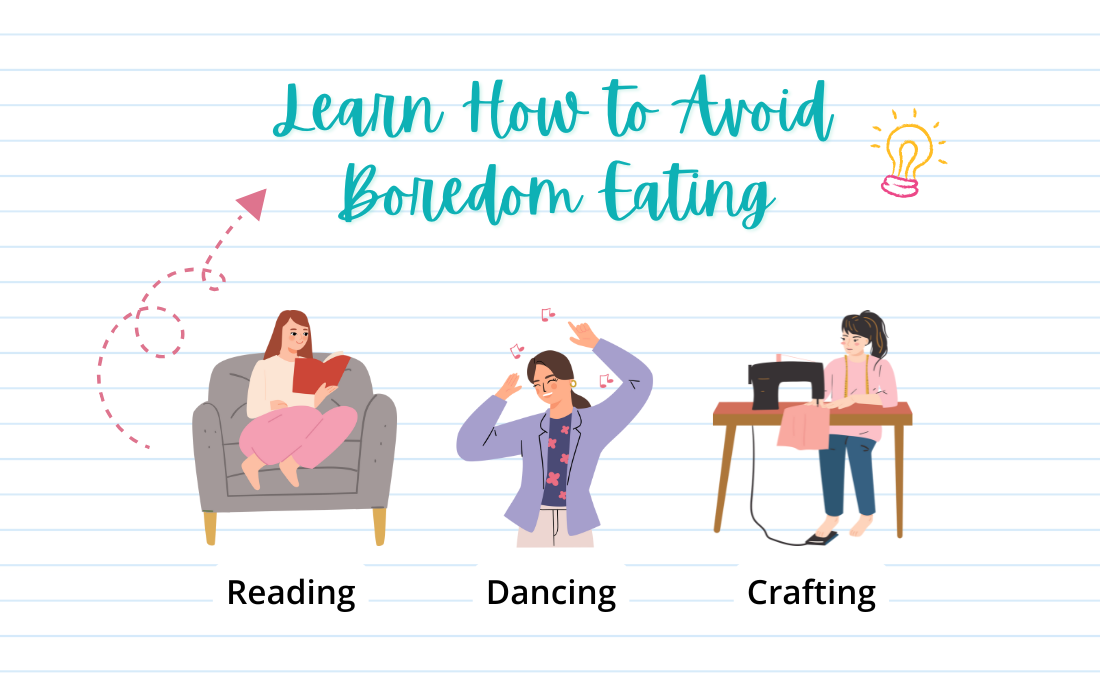
9. Practice Mindfulness while Eating
This tip is cliche but true; slowing down helps us be IN the experience of eating.
When we binge, we are usually going so fast that we don’t even enjoy the food! See if you can slow down and notice each bite, experiencing the taste, texture, and satisfaction level of your food. This helps you tune into when you’ve had enough.
10. Eat Balanced Meals
My recommendation is to eat every 3-4 hours and add protein every time you eat.
You can experiment with a balance of protein, healthy fats, carbs, and fiber. This keeps you full longer and reduces cravings for less nourishing foods.
11. Get Your Sleep
Simple but true!
Sleep is important and lack of it can disrupt hunger hormones and lead to overeating, so aim for 7-9 hours per night to support your body and mind.
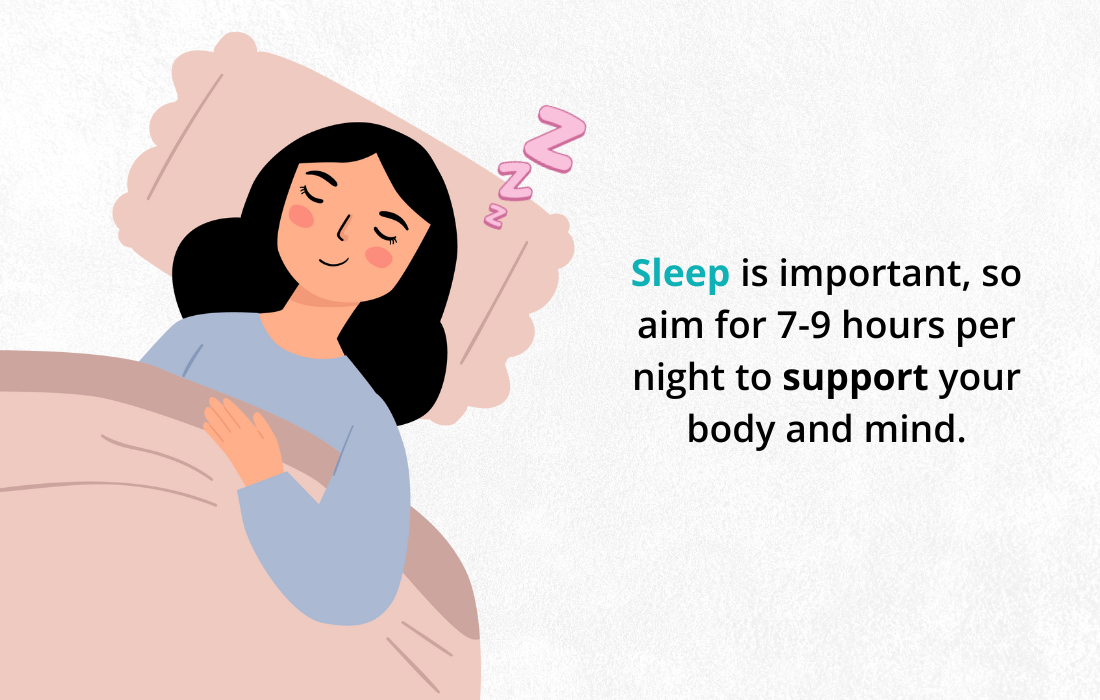
12. Start Working with a Food Coach
Sometimes these battles are best won with extra support.
Getting help from a food coach or binge eating coach provides support, tools, and personalized guidance to help you build a healthier, more intuitive relationship with food.
How the Mood-Food Cycle Affects Eating Habits
Our moods and eating habits are connected.
Stress, anxiety, or sadness can trigger emotional eating, while overeating can lead to guilt, creating a vicious cycle. Breaking this cycle involves addressing your emotions directly and finding non-food ways to manage stress and uplift your mood.
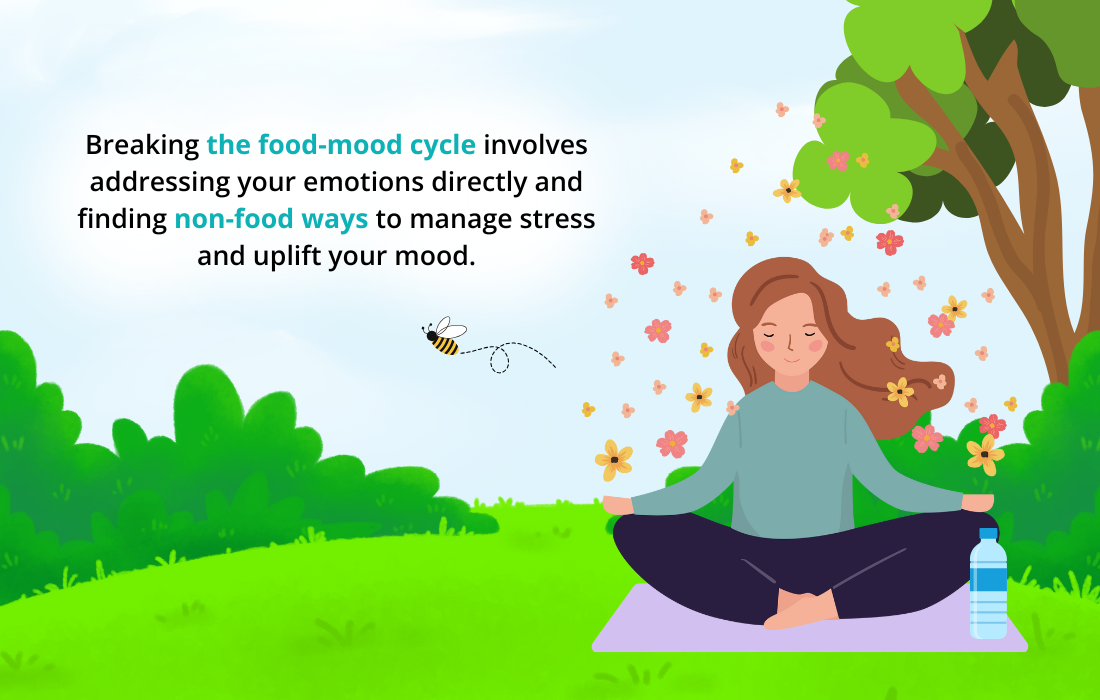
Understanding Cravings and Why They Happen
Physical cravings often result from hunger, nutrient deficiencies, or imbalanced meals.
While emotional cravings stem from unmet emotional needs like comfort or distraction. Understanding the difference helps you make better food choices by addressing the root cause—whether it’s hunger or an emotion asking for attention.
Why Hard-Core Discipline Is Not the Solution to Binge or Emotional Eating
I battled this one for years.
But the more discipline I tried to exert, the more out of control I actually felt. White-knuckling your way through cravings and emotions only leads to more frustration and potential bingeing. Instead, the solution lies in cultivating balance, trust, and a curious approach to your eating habits.
This means honoring your hunger, addressing your emotions, and working to let go of rigid food rules.
How to Get Back on Track If You’ve Been Overly Indulgent
If you’ve been indulgent, focus on getting back to balanced, nourishing meals rather than punishing yourself.
Recommit to eating every 3-4 hours and adding protein to your meals/snacks. Rehydrate, eat something nutrient-dense, and approach your next meal with mindfulness instead of guilt.
Remember, one indulgent period doesn’t define your journey—it’s just a small part of the big picture.
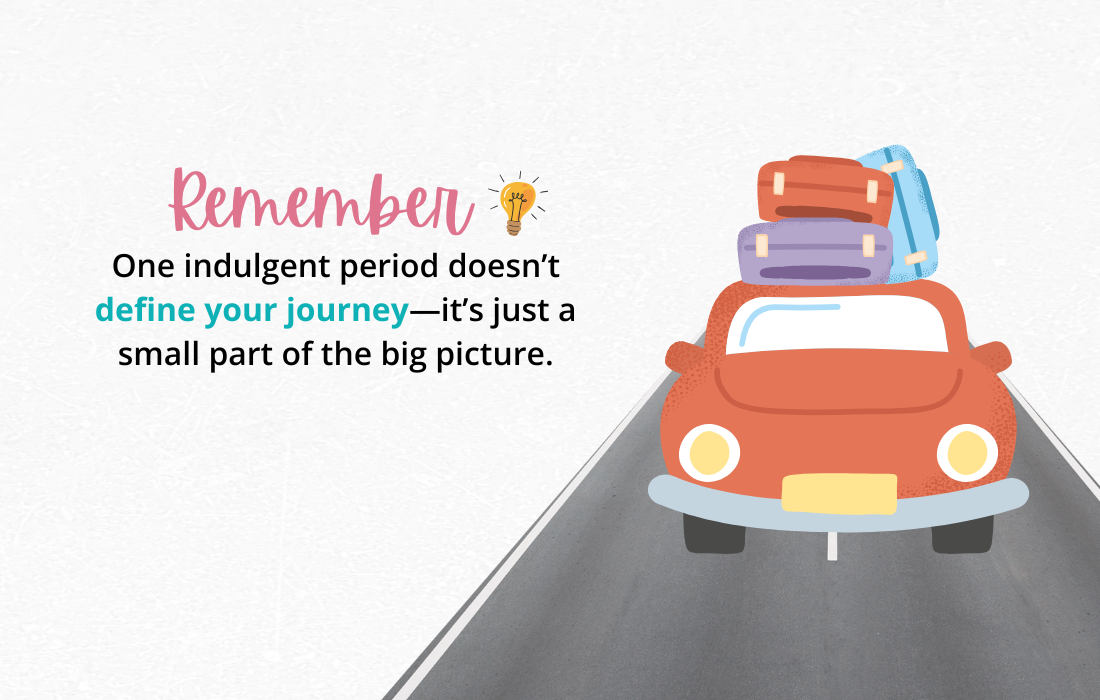
Work With a Health Coach who Specializes in Emotional Eating
Many of my clients have experienced remarkable changes—like overcoming binge cycles, learning to enjoy food without guilt, and developing lasting self-trust.
Working with a health coach who understand binge and emotional eating can help you gain personalized tools and ongoing support to address emotional eating at its root, creating freedom and balance with food.
Here’s what one client had to say after our work together:
I have tried everything imaginable to stop binging over the last 20 years. I did courses, books, videos, hypnosis, and other therapies. Jenn has created a program that is so well done and comprehensive that it doesn’t miss a thing. She is incredibly intuitive and gets to know you so she can help you in the most custom fit way possible. She has endless resources to assist you on your journey. Because her programs last months and not weeks you don’t have to feel rushed during the healing process. Don’t waste another day of your life moving in a direction you aren’t proud of when you can have a coach who can teach you a new and better way. Any time I ever wanted to truly get better at something I hired a coach and trusted the process. This was the best investment in myself and I am forever grateful for Jenn.
You can read more of my clients’ stories and experiences here >
Why I Don’t Like the Term “Eating Disorder”
The term “eating disorder” isn’t my favorite, as if it’s a lifelong label rather than a challenge you can overcome.
For many, it’s more helpful to see food struggles as patterns to unlearn, which opens the door to healing and developing a more natural, intuitive way of eating.
Common Questions
How can I stop food cravings?
Explore the root of your cravings—get curious to see if they stem from emotional needs, restriction, or lack of nourishment—and experiment with adding more satisfying meals to your day while addressing emotional triggers.
Do I need discipline and self-control to lose weight?
In my 10+ years as a coach, it’s never more discipline and self-control we need but a healing of our relationship to food.
A sustainable, positive relationship with food is built on listening to our body, meeting our needs, and creating balance—not just using willpower.
Is lowering food intake the key to weight loss?
Not necessarily.
Eating in a way that feels satisfying and supports your body’s needs is often more effective than focusing solely on cutting back on what you eat.
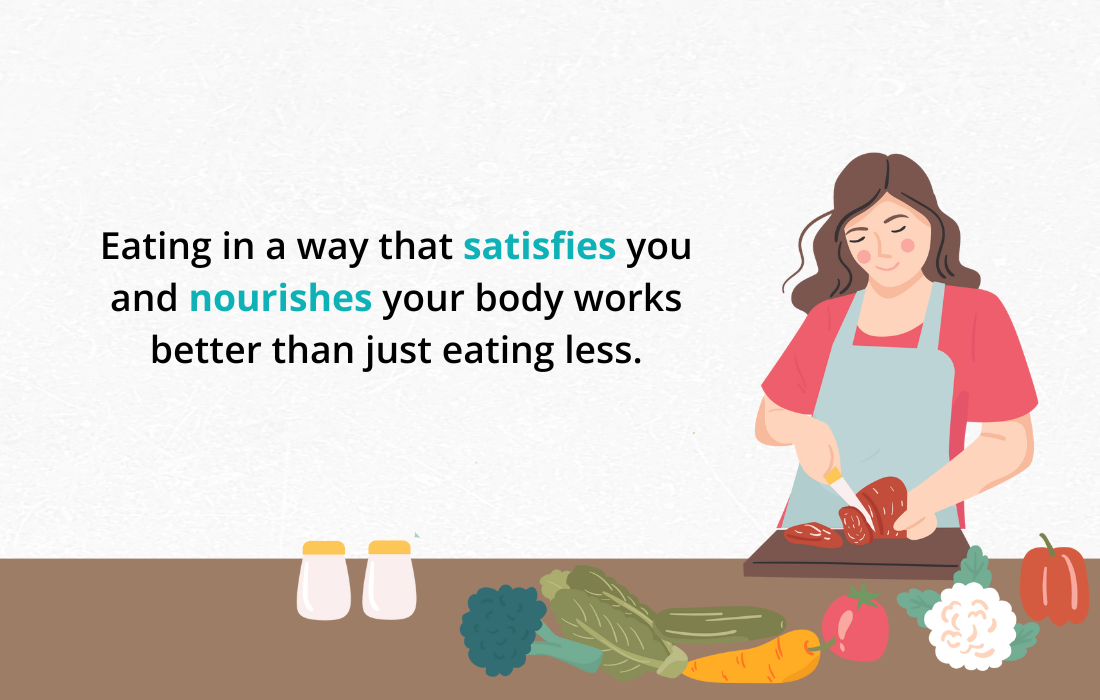
How can I gain more self-control if I have none?
Instead of self-control, focus on trust and balance.
Explore building trust with your body by tuning into hunger and fullness cues, practicing mindful eating, and working to find what balance around food (not dieting and not being in the “screw it” mentality looks like for you.
Are certain foods off limits if you’re trying to lose weight?
I’m a big fan of not having any hard and fast rules (as they usually backfire!) Allowing all foods in moderation helps you avoid the binge-restrict cycle and find a healthier relationship with eating.
How can I tell natural hunger signals vs emotional eating signs?
Natural hunger builds gradually, is satisfied by various foods, and feels physical, like a stomach growl or an energy dip. Emotional eating is often tied to a specific craving, and leaves you feeling unsatisfied even after eating.
Related Articles
⚪ Can I Eat Whatever I Want and Still Lose Weight?
⚪ How to Figure Out What to Eat So You Feel Nourished and Satisfied
⚪ How to Detox If You Ate Too Much Sugar
Get the Normal Eater’s Newsletter
Join 8000+ women who are overcoming overeating, binge eating, and breaking up with dieting forever. Get Jenn’s inspiring and actionable weekly newsletter with the latest posts, podcasts, and tips on how to love your body, find food freedom, and lose weight holistically.
Get the Normal Eater’s NewsletterWork with an Emotional Eating & Holistic Nutrition Coach
Overcome Bingeing and Emotional Eating and Break Up with Yo-yo Dieting
Working with an emotional eating coach and holistic nutritionist can help you get free from the frustrating binge and restrict cycle and stop yo-yo dieting.
You don’t have to be obsessed with food or have a million rules around eating to find your natural weight and learn to love your body. Ready to actually see a lasting change and experience true freedom?
Schedule a 20-min CallAbout the Author:

Jenn Hand has been helping women like you become normal eaters since 2015.
She’s worked with thousands of women, helping them to balance their bodies, end bingeing, stop obsessing over food, and start feeling amazing again. As a board-certified health coach and holistic nutritionist, Jenn knows how to support you in making real positive changes that last.
Her articles have been published on Mind Body Green, Tiny Buddha, Thrive Global and other local and global media platforms. She’s the author of How to Be a Normal Eater and the creator of The Normal Eater’s Club program. Listen to Jenn’s advice and tips on the Cake Doesn’t Count Podcast, or read more of her articles for free on the Food Freedom Blog.
Learn About Coaching!
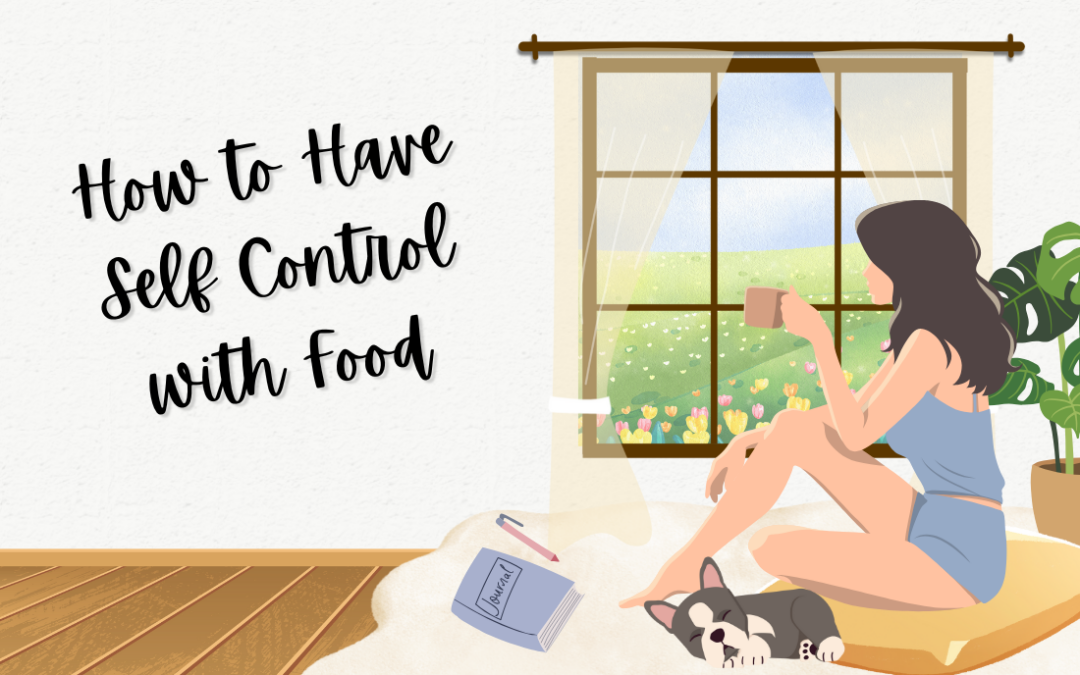




This is an awesome blog post with so much gold. Jenn is a wonderful, intuitive but clearly experienced and expert health coach. I highly recommend working with her to deepen trust in yourself and feel sane around food.
Thank you, Elena! Sending a hug 🙂